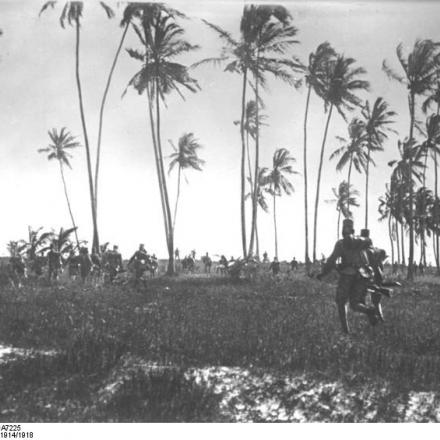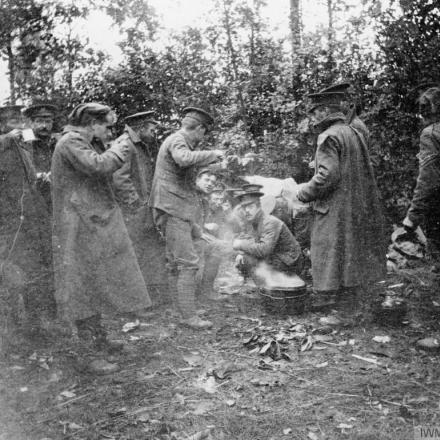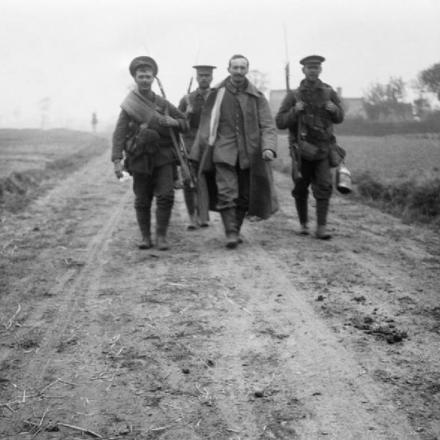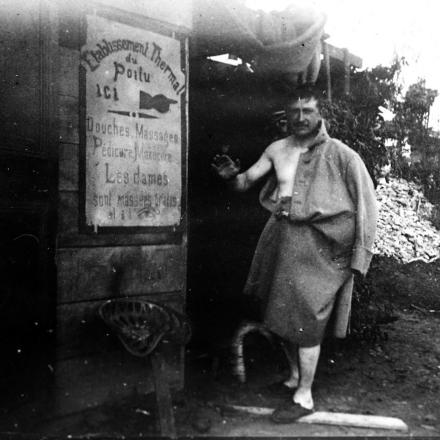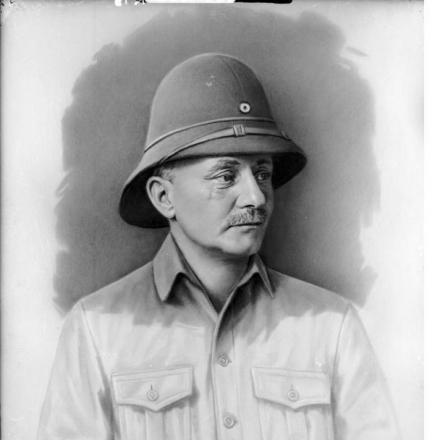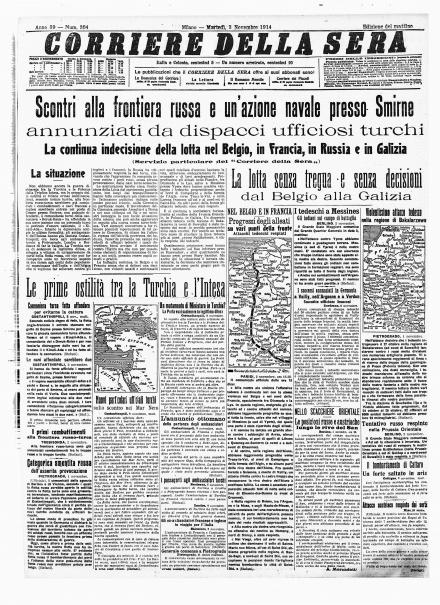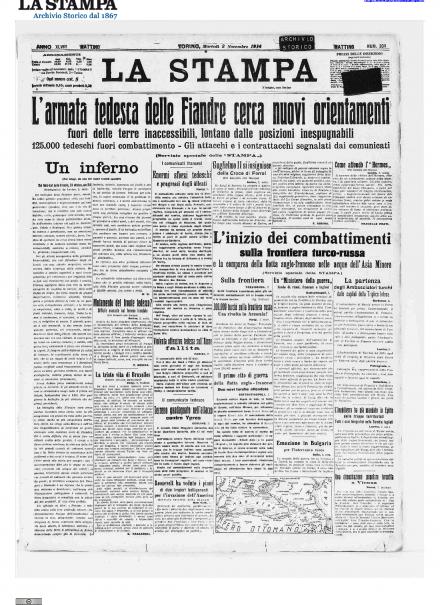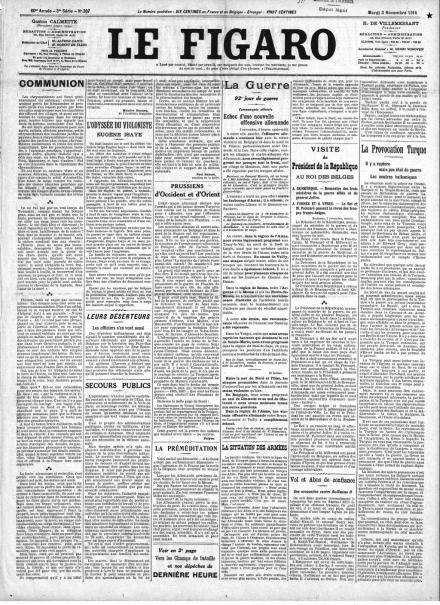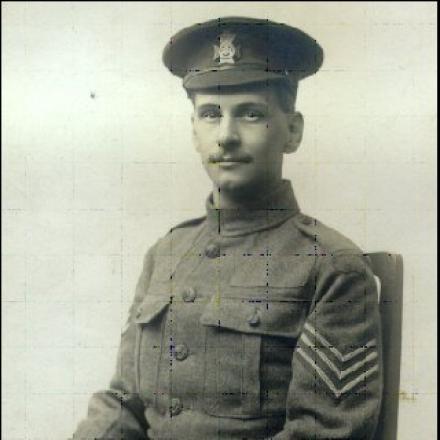La battaglia delle api
Serbia e Montenegro tagliano le relazioni diplomatiche e dichiarano guerra all’Impero Ottomano. La Bulgaria, al contrario, conferma l’intenzione di restare neutrale; almeno per il momento.
Nel Caucaso i russi infliggono la prima sconfitta ai turchi: occupano Degubayazit, vicino all’odierno confine armeno. Lo stesso giorno i forti ottomani sullo stretto dei Dardanelli patiscono il bombardamento della flotta Alleata.
Londra punta sulla Royal Navy per proteggere le coste britanniche. Il Mare del Nord viene minato, ma il 3 novembre i tedeschi riescono a portare la guerra sul litorale inglese: Gorleston e Yarmouth vengono bombardate, un sottomarino affondato e la Grande Flotta britannica costretta a ripiegare verso Scapa Flow, in Scozia. Non un bella figura.
Sull’Yser gli Alleati occupano le postazioni abbandonate il giorno prima dai tedeschi; Germania e Impero asburgico soffrono anche in Polonia: i russi raggiungono i Carpazi, vincono a Kielce, Nisko e Sandomierz.
Nel nord della Tanzania comincia la battaglia di Tanga. I britannici vantano una superiorità numerica di otto a uno, sembra tutto semplice, scontato; finora la Germania ha preso solo schiaffi in Africa. Non questa volta. Fronteggiare il Comandante tedesco Paul von Lettow-Vorbeck è un incubo, nulla di meno. Non c’è niente da fare, l’assalto viene respinto. Von Lettow-Vorbeck è un personaggio leggendario: l’unico alto ufficiale tedesco a concludere la guerra da imbattuto; farà impazzire gli inglesi ben oltre l’umana comprensione.
Questo primo scontro passerà alla storia come “la battaglia delle api”. Il motivo? Irritati dai militari, numerosi sciami di insetti imperversarono contro i soldati, bloccando più volte le operazioni.
Davide Sartori
GLI AVVENIMENTI
Politica e società
- Serbia e Montenegro dichiarano guerra all’Impero ottomano, alleato di Germania e Austria-Ungheria.
- La Bulgaria dichiara la sua intenzione nel rimanere neutrale.
- La Persia dichiara la propria neutralità e fa appello all'Inghilterra perché siano rispettati i suoi territori neutri.
- L’Ammiragliato britannico fa minare il Mare del Nord, dichiarato “zona di guerra”.
Fronte occidentale
- Gli Alleati occupano postazioni sull’Yser, abbandonate in precedenza dai tedeschi.
- I tedeschi occupano Vienne-le-Château nelle Argonne.
- Combattimenti sull’Aisne (Vailly, Chavonne, etc).
Fronte orientale
- I russi, dopo alcuni giorni di lotta (battaglia di Nisko e di Sandomierz) raggiungono i Carpazi.
- Polonia: i russi sconfiggono gli austro-tedeschi a Kielce, dove si stavano riprendendo.
Fronte meridionale
- Cattaro viene bombardata dai montenegrini.
Fronte asiatico ed egiziano
- Armenia: Degubayazit viene occupata dai russi.
- La flotta anglo-francese bombarda i forti esterni ottomani all’entrata dei Dardanelli.
- Arabia: Aqaba, sul Mar Rosso, viene bombardata e occupata dagli inglesi.
Fronte d’oltremare
- Le truppe britanniche attraversano per la prima volta il fronte tedesco dell’Africa orientale (Affare di Longido).
- Le truppe della colonia tedesca di von Lettow-Vorbeck sconfiggono i britannici nella battaglia di Tanga, nell’Africa orientale tedesca.
- Battaglia del Kilimanjaro.
Operazioni navali
- Primo assalto navale tedesco sulla costa inglese vicino Gorleston e Yarmouth, che viene bombardata.
- Il sottomarino inglese “D-5” viene affondato da una mina mentre combatte alcuni incrociatori.
- La Royal Navy ripiega verso Scapa Flow.
Parole d'epoca
Sergeant Bernard Joseph Brookes
Diario
At 7.00 am we disembarked and then had a fairly long wait until the transport was unloaded, and the inhabitants of the town gave us much needed ‘Café au Lait’ and hot rolls, to which we did justice.
We marched through the town to the rest camp at the top of the hill behind the town, and on our way up were heartily cheered, and all manner of gifts were bestowed upon us. A woman with a big basket of flowers either gave them all away or pinned them on the men as they marched along.
This shows the spirit of the people at that time. It seems that we were practically the first British troops landed at Havre, the previous base being St. Nazaire.
After a meal we were feeling much better, but permission could not be obtained to go into the town in case orders were received to move, but somehow or other I managed to wander out and was collared by a Lady and her daughter, and I had a long chat with them in French.
I then had a knowledge of French, the style taught in schools, and the Lady being rather excitable spoke hurriedly for about half an hour, and I must honestly say that I hardly understood a word about what she was telling me.
However I tried to look intelligent and now and then, when a pause presented an opportunity (which was by no means too often) I said “Oui c’est vrai” or “Non Madam”.
The daughter rather entered into the fun of the business, being able to see that I could not gather much of what was being said, and when she did get a chance of speaking with me, she spoke slowly and distinctly, and I was able to understand her quite well. I got on nicely with the daughter.
